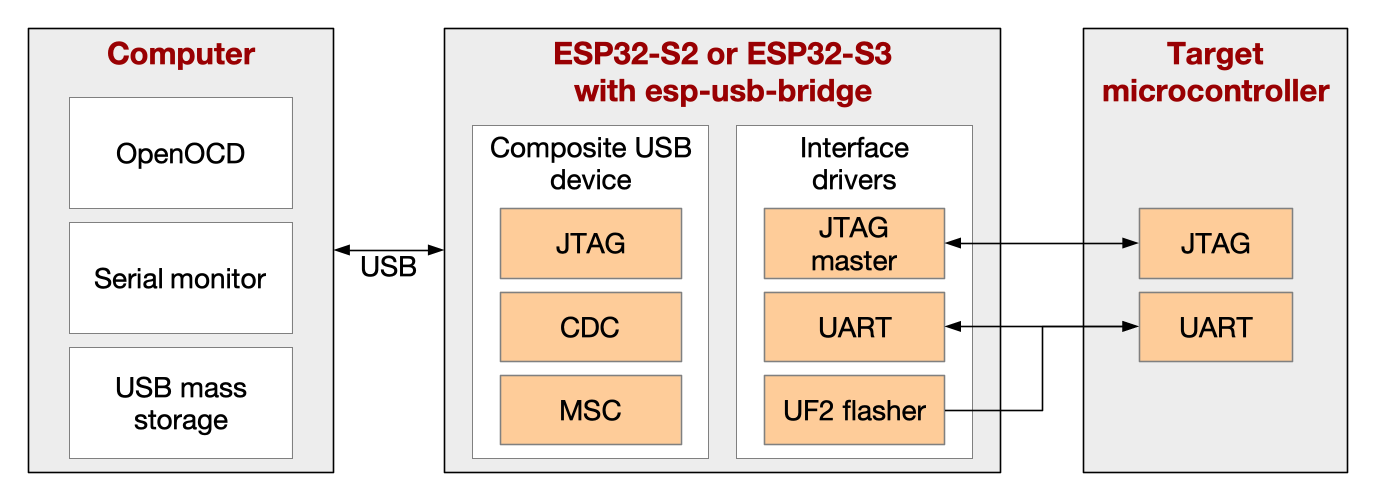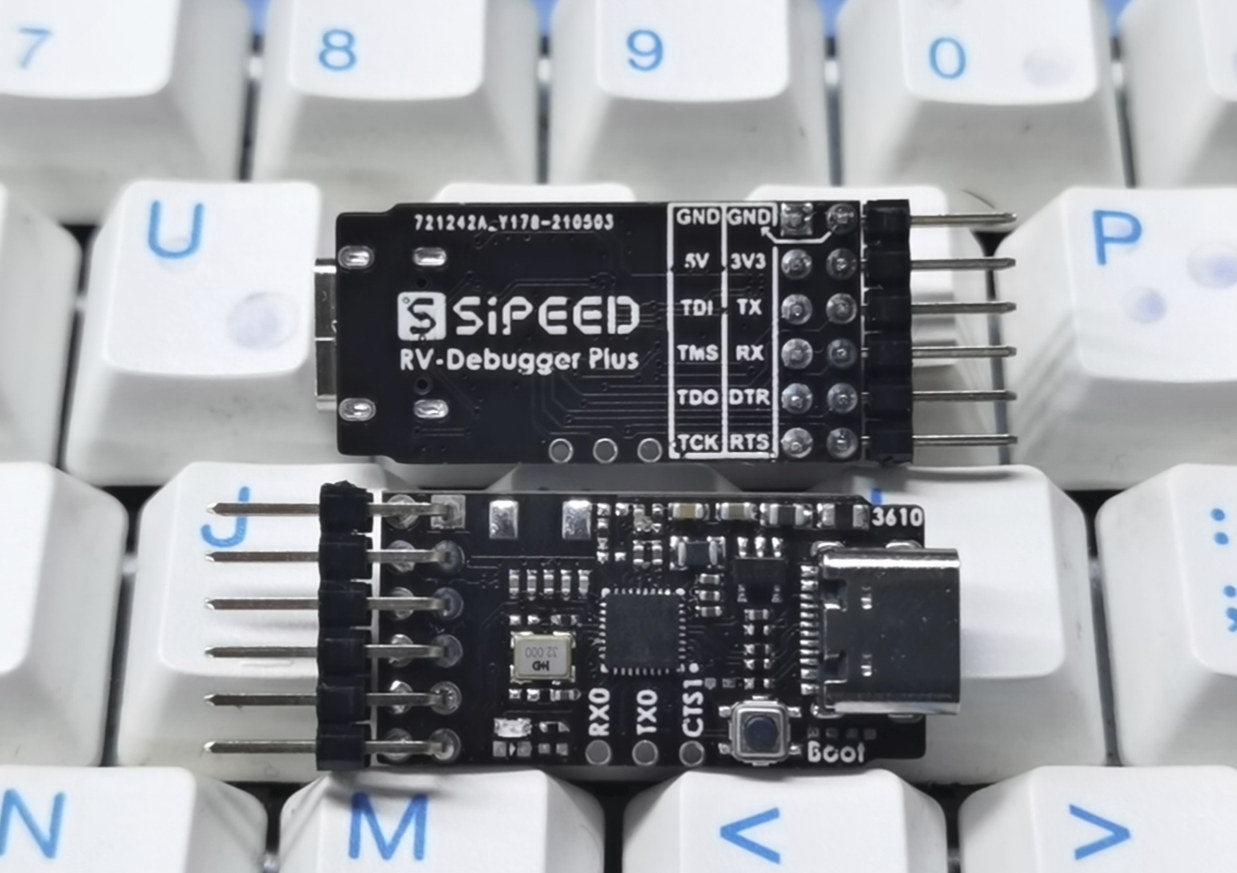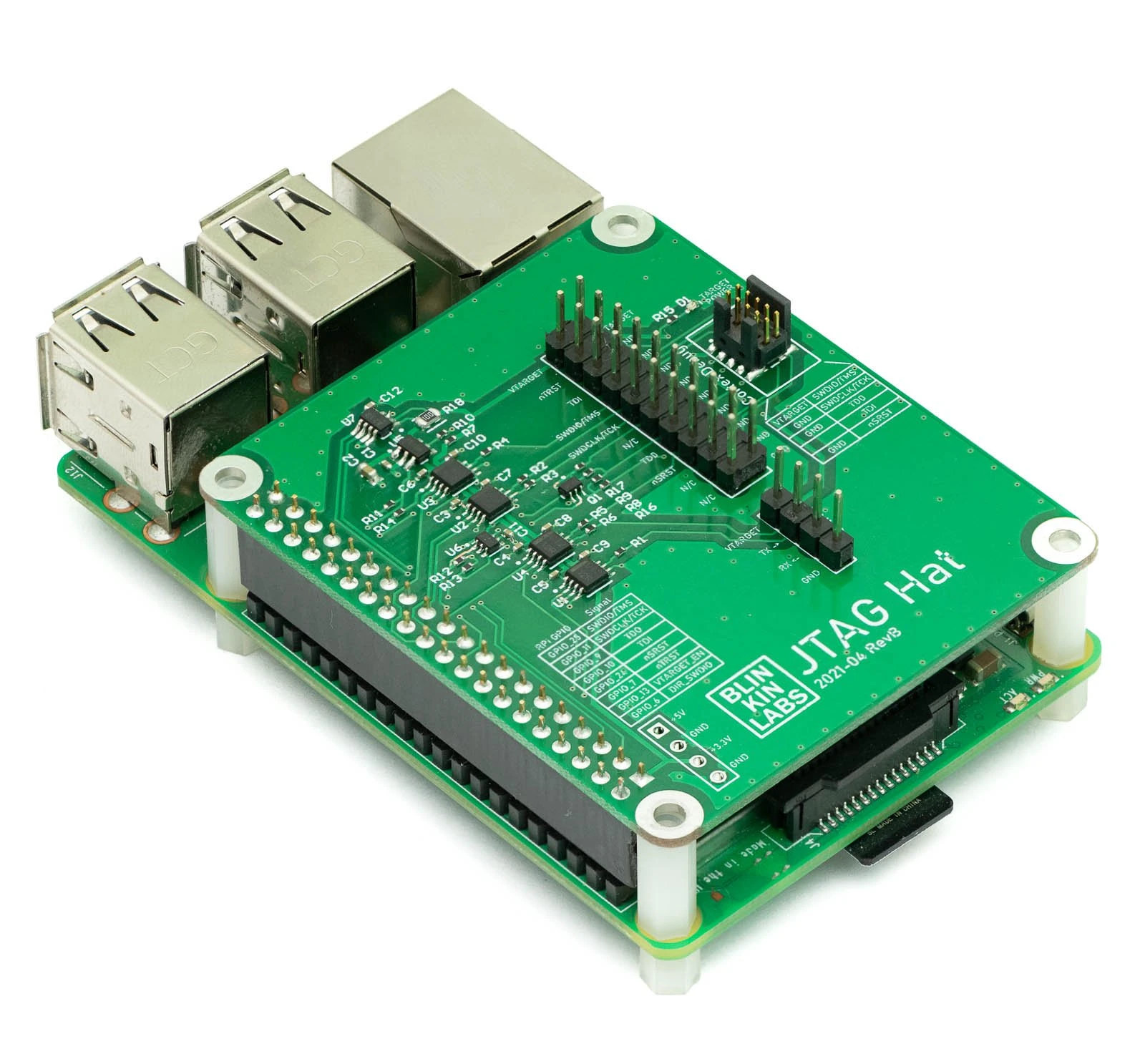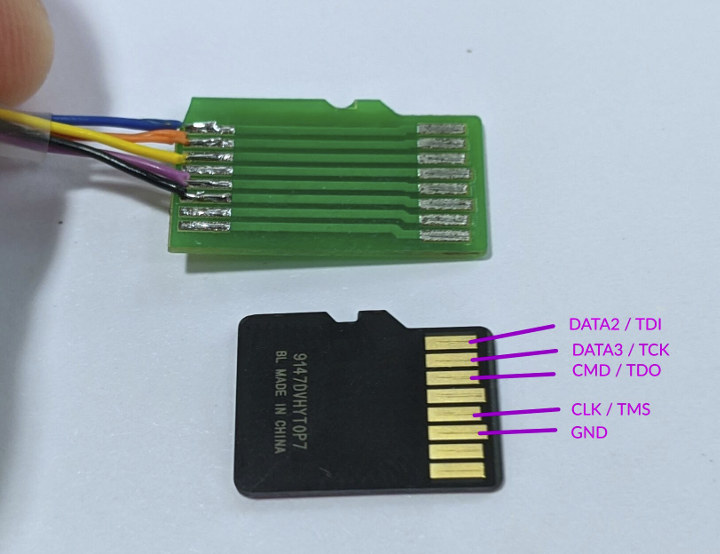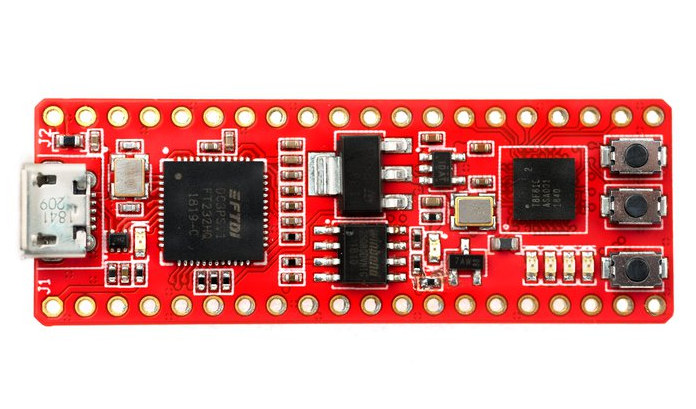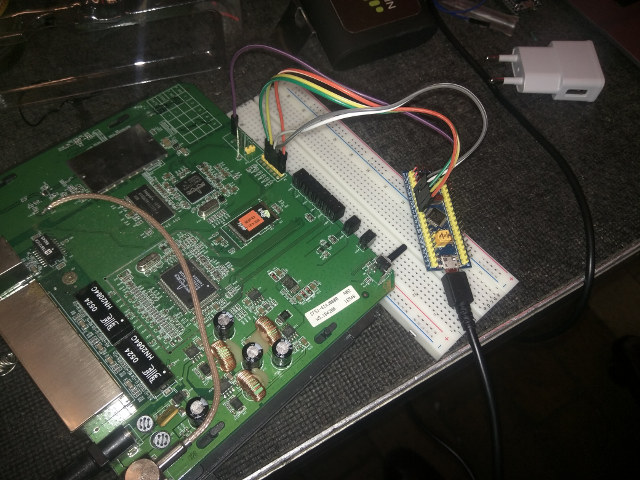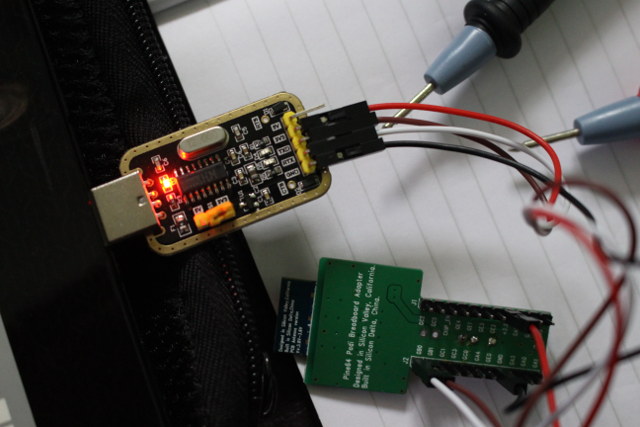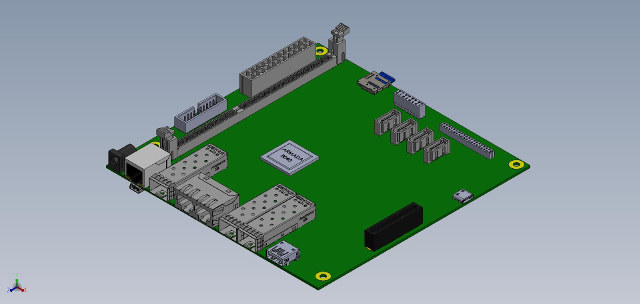Espressif’s ESP USB Bridge is a project based on the ESP-IDF that leverages ESP32-S2 or ESP32-S3 USB interface to use the board as a USB to UART or USB to JTAG debug board. It can serve as a substitute for USB to TTL debug boards based on CH340 or CP2104 for instance, be used with OpenOCD in JTAG bridge mode, and also flash UF2 firmware file to the target board. As just mentioned, there are three main use cases: Serial bridge mode with a terminal program or a firmware flashing tool like esptool. In that case, it just works like your typical USB to TTL debug board JTAG bridge mode for JTAG debugging with OpenOCD, and if the target board is based on ESP32, you can use openocd-esp32 project Mass storage device where the board can be accessed by a file manager on the host computer. One of the specific […]
$3.5 RV-Debugger Plus UART & JTAG debug board comes with BL702 Zigbee & BLE RISC-V SoC
USB to UART debug boards are a necessity for anyone playing with single board computers, at least when using bleeding-edge bootloader or Linux kernel where the target board may not always boot, or when troubleshooting booting problems. Those are often based on FDTI or WCH chips, but Sipeed RV-Debugger Plus features Bouffalo Lab BL702 Zigbee & Bluetooth LE RISC-V SoC instead and offers both UART and JTAG interfaces. So let’s have a look at both the board and SoC. Sipeed RV-Debugger Plus USB to TLL debug boards are meant to be simple and that’s the case for Sipeed latest BL702 board as it comes with a 12-pin connector with Tx/Rx for UART, 8 signals for JTAG, plus 5V, 3.3V, and GND power signals. We can also see pads for Tx/Rx/CTS, a boot button, a crystal oscillator, and a USB-C port to connect to the host computer. What I don’t see […]
JTAG Hat for Raspberry Pi eases debugging with OpenOCD
Low-level debugging can be performed with a JTAG debugger and OpenOCD open-source software, but since not everybody may have a JTAG debugger at home, some have reverted to using the Raspberry Pi as a JTAG debugger, and you’ll find instructions for cabling and installing the software on the Internet. Matt Mets of BlinkinLabs have been using the Raspberry Pi SBC and OpenOCD to debug Arm-based microcontroller boards for a while, but found it to be a pain to find jumper wires and look up the pin-outs manually each time. So he designed a JTAG Hat with properly labeled 20-pin .1″ and 1.27mm Cortex debug connectors to speed up the process. The expansion board also adds level-shifting buffers to interface with targets running at 1.8-5V, transistor-based power reset pins, a power switch for optionally supplying 3.3V to the target, a voltage/current sensor for measuring the target power consumption, and a buffered […]
ESP32 JTAG Debugging can be done through a MicroSD Card Socket
Found in most microcontrollers and processors, JTAG is an industry standard for verifying designs and testing printed circuit boards after manufacture, and that is also often used for low-level debugging or reverse-engineering. Espressif ESP32 also has a JTAG interface, but interestingly it’s shared with the SD card interface, and in ESP32 LyRaT audio development board where both MicroSD card slot and JTAG header are present selection is made by jumpers. The extract from ESP32 LyRaT schematics above shows IO’s 12, 13, 14 and 15 can present on the SD card and 4-pin JTAG header. Some boards may not come with a JTAG header but may feature a MicroSD card slot, but you don’t have to solder wires to the board to access JTAG, and instead, you could simply use a custom MicroSD card adapter to insert into the MicroSD card socket of the board and access JTAG as explained by […]
$30 FireAnt Development Board Features Efinix Trion T8 FPGA (Crowdfunding)
When I think FPGA, company names such as Xilinx, Altera (now Intel), or even Microsemi come to my mind. But there are also other companies such as Anlogic or Lattice Semi that offer FPGA chips. Today I’ve come across another FPGA silicon vendor, namely Efinix, with their Trion T8 FPGA found in XIPS Technology’s tiny FireAnt development board targeting makers and hardware designers. FireAnt specifications: FPGA – Efinix Trion T8 (T8F81C2) with 7384x LE counts, 8x embedded multipliers, 1x low-power oscillator, 1x PLL, 122.88 kbit internal RAM; Package – BGA-81 (5×5 mm) Storage – 8 Mbit serial NOR Flash Expansion – 2x 20-pin headers (soldered or unpopulated) with up to 35 GPIOs Debugging & Programming Micro USB 2.0 port via FTDI FT232HQ USB to serial chip JTAG signals in bottom layer Misc – Onboard 33.333 MHz crystal oscillator for PLL; 6x LEDs including 4 user configurable; 3x buttons (Reset, BTN1, […]
DirtyJTAG Firmware Convert $2 STM32 “Bluepill” Boards or ST-Link V2 Clones into JTAG Adapters
DirtyJTAG is a JTAG adapter firmware for cheap STM32 boards like BluePill or equally inexpensive ST-Link V2 clones that was developed to create an alternative to the cheap – but now obsolete – LPT Wiggler cables, and more expensive USB JTAG probes. You’ll find the source, and documentation on Github. First, you’ll need to flash the firmware using the DFU method or an SWD programmer (for ST-Link) or USB to TLL debug board (for STM32 dev boards), before making the connection to the target board as shown below (for Bluepill). STM32 JTAG PA0 TDI PA1 TDO PA2 TCK PA3 TMS PA4 TRST PA5 SRST You can then use mainline UrJTAG for your newly flashed JTAG adapter. If you prefer OpenOCD, it might eventually be possible to use Versaloon firmware instead on STM32 Bluepill board. Thanks to Zoobab for the tip. Jean-Luc Aufranc (CNXSoft)Jean-Luc started CNX Software in 2010 as a […]
Getting Started with Pine64 PADI IoT Stamp – Part 2: Serial Console, GCC SDK, Flashing & Debugging Code
PADI IoT Stamp module powered by Realtek RTL8710AF ARM Cortex M3 WiFi SoC is a potential competitor to Espressif ESP8266 modules. Pine64, the manufacturer of the module, sent me their kit with a $2 IoT stamp, a breakout board, a USB to TTL debug board and a J-Link debug board. In the first part of the review I’ve shown the hardware and how to assemble PADI IoT stamp kit. In the second part I’m going to write a tutorial / getting start guide showing how to control the board with AT commands, build the firmware with GCC SDK, and finally demonstrate how to flash and debug the firmware with the J-Link debugger. The Quick Start Guide indicates you need to connect the USB to TTL debug board to UART2 instead of UART1 as I did on the very similar B&T RTL-00 RTL8710AF module, and set connection settings to 38400 8N1. […]
ARMADA 8040 Networking Community Board with a Quad Core ARM Cortex A72 SoC Coming Soon for $300 and Up
Developers interested in ARMv8 server or networking boards are starting to have more and more affordable choices. After AMD Opteron A1100 series based LeMaker Cello board, and Softiron Overdrive 1000 server, SolidRun is now working on ARMADA 8040 networking community board powered by Marvell ARMA8040 quad core Cortex A72 network processor. ARMADA 8040 networking board (mrvl8040) preliminary specifications: SoC – ARMADA 8040 (88F8040) quad core Cortex A72 processor @ up to 2.0 GHz with MoChi architecture System Memory – 4GB DDR4 DIMM by default Storage – 4x SATA 3.0 port + micro SD slot Connectivity – 1x Gigabit RJ45 port, 1x SFP SGMII @ 2.5Gbps, dual 10Gbps copper with auto switchover to dual SFP+ Expansion – 1x PCIe-x4 3.0 slot, Linaro 96Boards expansion slot exposing GPIO, UART, I2C and SPI, Marvell TDM module header USB – 1x USB 3.0 port, 2x micro USB ports Debugging – Console port (UART) over […]


